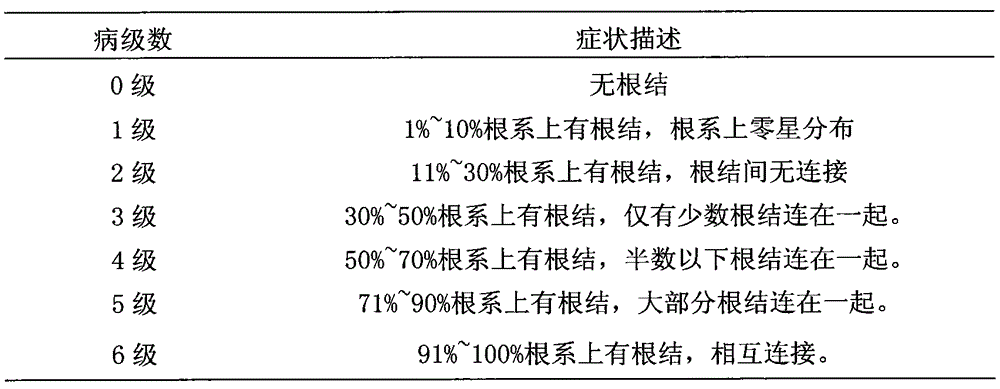Biocontrol fungi mixing bacterial agent for preventing and controlling plant meloidogyne diseases, and applications thereof
A technology for biocontrol of fungi and knot nematodes, which is applied in the fields of agricultural, forestry and horticultural crop protection, can solve the problems of declining control effect of tomato root-knot nematode disease and reducing the population density of banana perforating nematodes, etc.
- Summary
- Abstract
- Description
- Claims
- Application Information
AI Technical Summary
Problems solved by technology
Method used
Image
Examples
specific Embodiment 1
[0010] Specific example 1: the prevention and control effect of P. lilacinus HS-12 and Clonosporium pinkus HLD-1 mixed powder on root-knot nematode
[0011] The experiment was carried out at the Langfang Base of the Institute of Plant Protection, Chinese Academy of Agricultural Sciences. Including four treatments of HS-12, HLD-1, HS-12+HLD-1, and blank control, 30 seedlings per treatment, 3 replicates, randomly arranged in a plot with an area of 6m x 0.7m. Before the cucumber was transplanted, the nematode soil was collected by the five-point sampling method, and the nematode density in the plot was determined to be 300 eggs / 100g dry soil by the sucrose centrifugal flotation method. Mix the single bacterial agent and the mixed bacterial agent with a small amount of sand and substrate (sand: substrate = 1:1), so that the final concentration of biocontrol bacteria reaches 10 6 cfu / g, applied in holes when transplanting, 30-50g per hole. For each treatment, 30 cucumber seedli...
specific Embodiment 2
[0017] Specific embodiment 2. the prevention and control effect of P. lilacensis HS-12 and Clonosporium pinkhelix HLD-1 mixed liquid bacterial agent on root-knot nematode disease
[0018] The experiment was carried out in Experimental Field 1 and Experimental Field 2 of the Langfang Base of the Institute of Plant Protection, Chinese Academy of Agricultural Sciences. Each test field is divided into 12 plots (length 6m×width 0.7m), which are divided into four treatments of HS-12, HLD-1, HS-12+HLD-1 and blank control, and three plots are repeated for each treatment, arranged randomly . 30 seedlings were sown per treatment. 100mL5×10 cucumbers were used 15 days before transplanting, when transplanting and 10 days after transplanting. 6 Spores / mL of HS-12, HLD-1 and mixed liquid fungal agents for root irrigation (Table 3).
[0019] Table 3 HS-12 and HLD-1 liquid bacterial agents and their combined field treatment methods
[0020]
[0021] 15 days before transplanting, the so...
PUM
 Login to View More
Login to View More Abstract
Description
Claims
Application Information
 Login to View More
Login to View More - Generate Ideas
- Intellectual Property
- Life Sciences
- Materials
- Tech Scout
- Unparalleled Data Quality
- Higher Quality Content
- 60% Fewer Hallucinations
Browse by: Latest US Patents, China's latest patents, Technical Efficacy Thesaurus, Application Domain, Technology Topic, Popular Technical Reports.
© 2025 PatSnap. All rights reserved.Legal|Privacy policy|Modern Slavery Act Transparency Statement|Sitemap|About US| Contact US: help@patsnap.com



